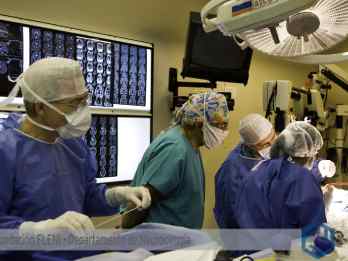Minimally invasive surgery and endoscopy

Minimally Invasive Surgery consists of a series of procedures in which doctors use highly specialized instruments to minimize damage to normal tissue during surgery. It is performed through smaller incisions and bone openings. We have developed and are experts in advanced Minimally Invasive and Endoscopic Neurosurgery techniques. We use these techniques in both adults and children whenever we believe we can achieve similar or better results than conventional "open" techniques (larger incisions and larger bone openings). These procedures allow us to achieve better results with less risk for patients:
- Shorter surgeries
- Fewer hospital stays
- Faster recovery
- Smaller scars
- Less postoperative pain
- Fewer complications
All of these conditions allow the patient to return to their normal life more quickly without compromising the safety and effectiveness of the treatment. Furthermore, some diseases that could not be treated with traditional surgery can now be treated with minimally invasive surgery. The success of Minimally Invasive Neurosurgery depends on the skill and training of the neurosurgeon and the use of sophisticated instruments and technology. We are trained in the latest advances in this technology, being pioneers in Minimally Invasive Surgery and Brain Endoscopy in Argentina. We are pioneers in Minimally Invasive Surgery and Brain Endoscopy in Argentina and Latin America, having created the Ventricular and Cerebral Neuroendoscopy Training Course Program at the "Prof. Dr. J. P. Garrahan" Pediatric Hospital in 2013. We have also developed Ventricular and Cerebral Neuroendoscopy Training Courses at FLENI and De Los Arcos since 2018. Since then, we have offered more than 20 national and international courses. We perform minimally invasive and endoscopic treatment for the following conditions:
- Hydrocephalus: endoscopic treatment
- Tumors, cysts, and brain lesions: endoscopic, minimally invasive treatment with PORT-Brain Surgery, stereotaxy, and neuronavigation
- Chiari malformation
- Craniosynostosis
- Diseases of the spine and spinal cord
- Epilepsy and functional surgery
- Vascular malformations
Patologías
- Tumores cerebrales
- Tumores de columna y médula espinal
- Tumores craneales
- Tumores de órbita
- Tumores de hipófisis
- Hidrocefalia
- Quistes aracnoideos
- Malformación de Chiari
- Malformaciones congénitas del cerebro y columna
- Defectos del cierre del tubo neural
- Sindromes craneofaciales
- Craneosinostosis
- Epilepsia
- Espasticidad, movimientos anormales y parálisis cerebral
- Patología vascular
- Traumatismo encéfalo-craneal
- Traumatismo de columna
- Infecciones cerebrales y de columna



